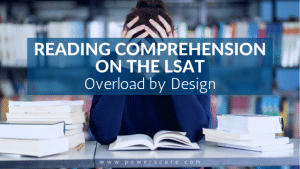Diagramming and notation can play a vital role in a strong performance on the Reading Comprehension section of the LSAT. The ideal approach to effectively breaking down the passages, however, can be different for each student. Unlike Logic Games, when it comes to Reading Comprehension passages there is no single best way to diagram or notate. There are, however, several diagramming options from which to choose. Basic Underlining This is the … [Read more...]
What to Do When You’re Feeling Defeated by LSAT Prep
Our free to use LSAT Discussion Forum is a tremendous resource for any student gearing up to take the LSAT and apply to law school, and while I'm sure the majority of our blog readers frequent the Forum and participate, it's easy for helpful posts there to slip through the cracks. In an effort to help our readers here stay fully informed, we occasionally have highlights of common questions we encounter in the forum. Two things first:Go use … [Read more...]
Get a Grip on your LSAT Prep
It's fair to say that we generally think of friction as a negative thing. That's basically an accurate view in the context of personal and societal relationships. But, friction can also be very useful, even necessary, in other settings. For example, LSAT prep. We're going to go into how you can adapt the concept of friction to grain traction in your prep and accelerate past the plateau you may be on. How Friction it Works In case you need a … [Read more...]
Negating Conditional Statements
Most Logical Reasoning questions with conditional reasoning won’t require you to negate the conditional relationships in them. You will certainly need to know what the contrapositive is, and—if there are multiple conditional relationships—you need to know how to form a conclusion by combining them into a chain (aka the “law of syllogism”). Occasionally, in Justify questions, you will need to establish a logical link between the premises and the … [Read more...]
Taking the LSAT in France
Are you taking the LSAT in France? Students take the LSAT if they plan to attend law schools in the US and Canada. However, the test administers across the globe. Check out this post about taking the LSAT abroad.In France, only one location offers the LSAT: Paris, Eurosites Paris La Chapelle. While there is just one location option, it occurs four times per year: February, June, September/October, and December. You can find a complete list of … [Read more...]
Reading Comprehension on the LSAT: Overload by Design
The LSAT's Reading Comprehension passages are typically dense and convoluted. Clearly, it's not lazy summer beach reading. But what is the reason behind the design? Reading vs. Reading Comprehension When we read a passage, we're performing several mental processes all at once. For example, as we read a sentence, we identify individual words and combine them into phrases and sentences. An experienced and skilled reader, such as a law school … [Read more...]
Need LSAT Advice? How to Help Us, Help You
One of the most common LSAT preparation questions we receive is: "I've been studying for a while and want to increase my score even more. Do you have any tips to help me out?" This is a question we love to get because it directly relates to what we do. We love the LSAT, and we are passionate about helping students get better at taking this test.When answering this question, one of our goals is to provide advice that is specific to the … [Read more...]
Attacking Logic Games: Focus on Certainty!
Understanding Global and Local question strategies in Logic Games is difficult. Dave's blog post on the subject got me thinking about recent conversations I've had with students on similar topics, primarily with respect to efficient inference making and question attack. So I'm going to supplement his insights with a few of my own. Positive and Negative Certainty We focus a tremendous amount of time and attention in our courses and books … [Read more...]
Find Success within the 4 Corners of the “Must Be True” Stimulus
Often, people studying for the LSAT have trouble figuring out how the test has anything to do with real life, let alone law school or the practice of law. But the connection is clear with Must Be True questions. It all comes down to the "four corners" rule. The Four Corners Rule In Must Be True questions, you're limited to the information in the stimulus. You can't bring in any outside information. So, the correct answer choice will be either … [Read more...]
Bored with Reading Comprehension? Maybe That’s the Problem
Reading Comp may be your worst section. Students often admit boredom with it; "hate" is a commonly used word. Nobody cares about Navajo weaving techniques, 18th century French female poets, or the !Kung people. Why should you? Here's why: Low Interest Reading A number of research studies show that test-takers who report a high level of interest in the topic of a passage also demonstrate higher levels of engagement with the text. The presence of … [Read more...]
Global/Local Question Answering Strategies
A while back, I received an interesting question from a student: “Hi, I have your Logic Games Bible and have a question. Another book recommends answering local “if” questions first then doing what you call global questions. I don't believe the Bible makes any recommendations about which questions to answer first. Do you have a question ordering strategy or you simply recommend answering them in the order they appear on the test?” Strategies … [Read more...]
How to Guess Like a Pro on the LSAT Part I: Logic Games
There is no penalty for guessing on the LSAT. So, it should go without saying that you shouldn't leave any questions blank. Precisely how you guess, however, depends on a number of factors.Are you a strong test-taker? Can you at least narrow down your possible choices? Which questions do you need to guess on?Let's break it down. Blind Guessing According to our Guessing Strategy and Probability Tables, you would be best served by … [Read more...]
Tiered Circular Games: AKA the 10th Circle of LSAT Hell
The last time a Circular Linear game made an appearance on an LSAT was the February 2014 exam. Unfortunately, this test is undisclosed, so we will never actually see the game. This very game is also rumored to be a "tiered circular linear" game. It involves two variable sets to be distributed around a circle. We'll never know for sure, but such a game is not outside the realm of possibility. The following list shows every single appearance of a … [Read more...]
The Most Common Logical Reasoning Question Types
If your LSAT is fast approaching, you're inevitably wondering how to best prioritize your study efforts. A good place to start is figuring out which Logical Reasoning question types to focus on. To that end, here's a dissection of released LSATs from June 2013 to June 2015. Let's see exactly what the test makers have emphasized and what they've relegated to a back shelf. After all, if you know what your fellow test takers have faced, your own … [Read more...]














